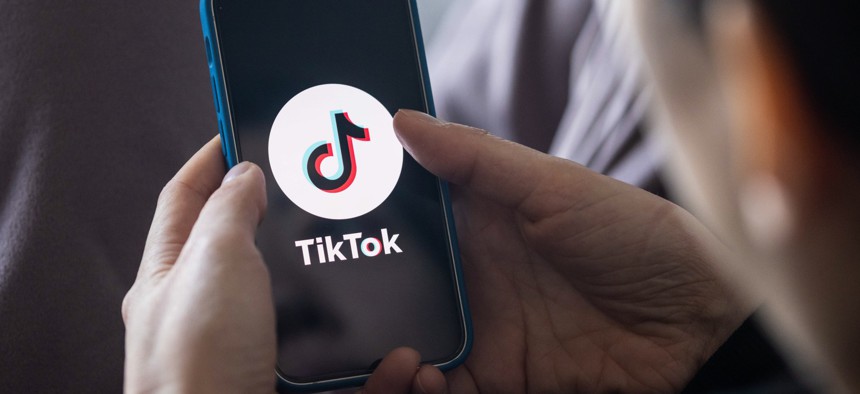Omnibus spending bill includes a ban of TikTok on government devices

SOPA Images /Getty
Sen. Mark Warner (D-Va.) told FCW on Monday that Congress might have more work to do regarding national security implications of popular video-sharing app TikTok in the next session of Congress.
The government funding package released Tuesday by the House and Senate appropriations committees includes a provision to ban popular video-sharing app TikTok from government devices. But this likely isn't the end of national security concerns about the app coming from lawmakers and top government officials.
"The administration has said they think there's a way they can keep that American data safe," Sen. Mark Warner (D-Va.), chair of the Senate Intelligence Committee, told FCW yesterday. "They've not come up with an answer yet. It's been a year. So I have grave doubts about that."
The Committee on Foreign Investment in the United States, an interagency group based at the Department of the Treasury, has been grappling with concerns arising from Chinese ownership of the site. The Trump administration tried and failed to force a sale of the website to a U.S. company. Bans on the website have been proposed in previous defense policy bills. Additionally, Buzzfeed reported in June that data on U.S. users was accessed by company officials inside China.
TikTok's chief operating officer Vanessa Pappas said in congressional testimony in September that "we have not been asked for U.S. user data by the Chinese government. We have not provided such data to the Chinese government, nor would we if asked."
The provision in the funding package, called the No TikTok on Government Devices Act, sponsored by Sen. Josh Hawley (R-Mo.), passed the Senate last week, but had not yet passed the House. The bill previously made it through the Senate in 2020. The proposal requires TikTok, "or any successor application or service … by ByteDance Limited or an entity owned by ByteDance Limited," the Chinese parent company that owns TikTok, to be removed from government tech and devices.
"I know this is a very popular application…It's very addictive," Warner said when asked about how the restrictions on the app might fly with younger workers that the government is trying to recruit. "But in my mind this is a security threat on two bases."
The first: "the amount of data that's collected." The other worry is that "TikTok is also a communications medium," said Warner. "You could have, very quickly, the [Chinese Communist Party] having videos that say the Uyghurs are treated well in China or that, you know, Taiwan is really a piece of China. It could be used as a propaganda tool, and that's a concern to me."
"There's a lot of buzz about this that's happened in the last even just 60 days," Warner said. "And we may have to take additional steps even further legislatively next year if we don't see a solution set coming from the administration."
In a Dec. 2 talk at the Ford School of Public Policy at University of Michigan, FBI Director Christopher Wray cited concerns about the app's content recommendation algorithm, data collection practices and access to devices via the app.
"Its parent company is controlled by the Chinese government and it gives them the potential to leverage the app in ways that should concern us," he said. "The idea of entrusting that much data, that much ability to shape content and engage in influence operations, that much access to people's devices, in effect, to that government, is something that concerns us."
The federal legislation comes as states, including Maryland and Virginia, are increasingly proposing and passing laws prohibiting the app from their government devices.



